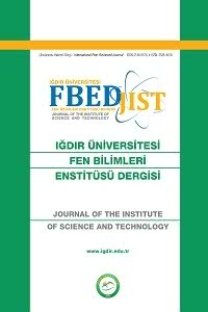Effect of Deficit Irrigation and Rootstocks on Fruit Weight During Post-Harvest Controlled Storage of Watermelon
Citron melon, deficit irrigation, watermelon storage, bottle gourd, TZ-148
Effect of Deficit Irrigation and Rootstocks on Fruit Weight During Post-Harvest Controlled Storage of Watermelon
Citron melon, deficit irrigation, watermelon storage, bottle gourd, TZ-148,
___
- Aras V, Özdemir AE, Yetişir H, Çandır E, Güler Z, Aslan. ... & Ünlü M, 2015. Changes in quality parameters in varieties of 'Crimson Tide' grafted watermelons under exhibiting conditions. Horticulture Cultures Research Station. 9.
- Bacon MA, 2004. Water use efficiency in plant biology. Blackwell. pp. 1–26.
- Bruton BD, Fish WW, Roberts W, Popham TW, 2009. The influence of rootstock selection on fruit quality attributes of watermelon. Open Food Sci J. 3: 15-34.
- FAO, 2017. http://www.fao.org/faostat/en/#data/QC. Date of access: 13.12.2019.
- Gerster H, 1997. The potential role of lycopene for human health. J. Amer. College Nutr. 16: 109-126. https://doi.org/10.1080/07315724.1997.10718661
- Giovannucci E, 2002. A review of epidemiologic studies of tomatoes. lycopene. and prostate cancer. Exp. Biol. Med. (Maywood.) 227: 852-859.
- Huh YC, Solmaz I, Sari N, 2008. Morphological characterization of Korean and Turkish watermelon germplasm. In: Pitrat M (ed): Cucurbitaceae 2008. Proceedings of the IXth EUCARPIA meeting on genetics and breeding of Cucurbitaceae. Avignon (France). May 21-24th. 327-33.
- Leskovar DI, Bang H, Crosby KM, Maness N, Franco JA, Perkins-Veazie P, 2004. Lycopene. carbohydrates. ascorbic acid and yield components of diploid and triploid watermelon cultivars are affected by deficit irrigation. J Hortic Sci Biotechnol. 79: 75-81. https://doi.org/10.1080/14620316.2004.11511739
- Naz A, Butt MS, Sultan MT, Qayyum MMN, Niaz RS, 2014. Watermelon lycopene and allied health claims. EXCLI Journal. 13: 650.
- Oda M, 2004. Grafting of vegetable to improve greenhouse production. Bull. National.
- Özdemir AE, Çandır E, Yetişir H, Aras V, Arslan Ö, Baltaer Ö.. ... & Ünlü M, 2018. Rootstocks Affected Postharvest Performance of Grafted ‘Crisby’ and ‘Crimson Tide’Watermelon Cultivars. Journal of Agricultural Sciences. 24 (4): 453-462.
- Özmen S, Kanber R, Sarı N, Ünlü M, 2015. The effects of deficit irrigation on nitrogen consumption. yield. and quality in drip-irrigated grafted and ungrafted watermelon. Journal of Integrative Agriculture. 14 (5): 966-976. https://doi.org/10.1016/S2095-3119(14)60870-4
- Pachauri RK, Meyer LA, Team CW, 2015. IPCC. 2014: climate change 2014: synthesis report. Contribution of working groups I. II and III to the fifth assessment report of the intergovernmental panel on climate change. J. Roman. Stud. Switz. 4: 85–88.
- Perkins-Veazie P, Collins JK, Clevidence B, Wu G, 2007. Watermelons and health. Acta Horticulturae: 731. 121.
- Sensoy S, Ertek A, Gedik I, Kucukyumuk C, 2007. Irrigation frequency and amount affect yield and quality of field-grown melon (Cucumis melo L.). Agricultural Water Management. 88: (1-3). 269-274. https://doi.org/10.1016/j.agwat.2006.10.015
- Tong BC, Barbul A, 2004. Cellular and physiological effects of arginine. Mini-Reviews in Medicinal Chemistry. 4: 823-832.
- Wisser D, Frolking S, Douglas EM, Fekete BM, Vörösmarty CJ, Schumann AH, 2008. Global irrigation water demand: variability and uncertainties arising from agricultural and climate data sets. Geophys. Res. Lett. 35: 1–5. http://dx.doi.org/10.1029/2008GL035296.
- Yavuz D, Seymen M, Yavuz N, Türkmen Ö, 2015. Effects of irrigation interval and quantity on the yield and quality of confectionary pumpkin grown under field conditions. Agricultural Water Management. 159: 290-298. https://doi.org/10.1016/j.agwat.2015.06.025
- Yetisir H. Sarı N. 2003. Effect of different rootstock on plant growth. yield and quality of watermelon. Australian Journal of Exper. Agriculture. 43: 1269-1274. https://doi.org/10.1071/EA02095
- Yetişir H, Sari N, 2018. Fruit and Seed Yields of Watermelon [Citrullus lanatus (Thunb.) Matsum. and Nakai] Grafted onto Different Bottle Gourd (Lagenarai siceraria Molina Standl.) Rootstocks. Asian Journal of Research in Agriculture and Forestry. 1-9. DOI: 10.9734/AJRAF/2018/41245
- Yoosefzadeh Najafabadi M, Soltani F, Noory H, Díaz-Pérez JC, 2018. Growth. yield and enzyme activity response of watermelon accessions exposed to irrigation water deficit. International Journal of Vegetable Science. 24 (4): 323-337. https://doi.org/10.1080/19315260.2017.1419329.
- ISSN: 2146-0574
- Yayın Aralığı: Yılda 4 Sayı
- Başlangıç: 2011
- Yayıncı: -
Multi Classification of Sleep Sounds using Support Vector Machines
Destek Vektör Makineleri Kullanarak Uyku Seslerinin Çoklu Sınıflandırılması
A Solution Approach for a Class of Parametric Linear Programming Problems
Mustafa SİVRİ, İnci ALBAYRAK, Kadriye ŞİMŞEK ALAN, Gizem TEMELCAN
Halil İbrahim AKOLAŞ, Ali Rıza KALELİ
Hibrit Kompozit Yapılarda Nanokil İlavesinin Darbe Davranışına Etkisi
Ümran ESENDEMİR, Recep ŞİMŞEK, Mehmet Fahri SARAÇ
Kastamonu Aktarlarında Satılan Bazı Tıbbi Aromatik Bitkiler ve Kullanım Alanları
Seydi Ahmet KAVAKLI, Şahin Gürkan YAYLACI, Emin UGURLU
Performance Analysis of SMDO Method with Benchmark Functions with Matlab Toolbox
Mehmet AKPAMUKÇU, Abdullah ATEŞ, Barış Baykant ALAGÖZ
Metamaterial based Flexible Coplanar Antenna Design and Simulation for Human Body Applications
Farklı Yaban Mersini Türlerinden Geleneksel Yöntemle Üretilen Sirkenin Bazı Kalite Özellikleri
Oktay TOMAR, Gökhan AKARCA, Ömer İSTEK
